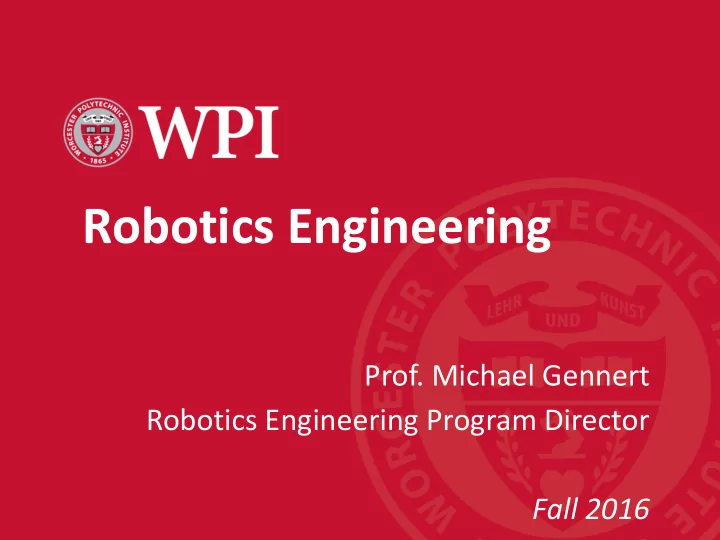

Robotics Engineering Prof. Michael Gennert Robotics Engineering Program Director Fall 2016
Robotics Education Gap Robotics Research PhD @ Large Research Robotics University Engineering Industrial Robotics Technology AA, AS @ “Making useful robots, Community College Making robots useful” 2
Motivation for Robotics Major Growth in importance of Robotics o Supply: Push of tech capability & cost o Demand: Pull of needs & applications K-12 interest in Robotics o Offer students what they want Great fit for WPI o Strong CS, ECE, ME o Project-based curricula o FIRST Team 190 tradition Leadership 3
Just do it! 2006 • Planning Committee & Advisory Board • Approved by Depts, Faculty, Trustees 2007 • BS – Hoped for 15-20 students, got 80 2009 • MS 2011 • PhD 4
Our Vision for Robotics Become an • Exemplary, nationally recognized, • Multidisciplinary center for • Education, research, and innovation in • Robotics
Faculty Electrical & Computer Engineering Computer Science David Cyganski Mike Ciaraldi Jim Duckworth Eugene Eberbach Jie Fu Mike Gennert Fred Looft Carlo Pinciroli Bill Michalson Craig Putnam Alex Wyglinski Chuck Rich Candy Sidner Mechanical Engineering Holly Ault Robotics Engineering (non-department) Toby Bergstrom Nick Bertozzi Chris Brown Ken Stafford Raghvendra Cowlagi Michael Demetriou Social Science & Policy Studies Greg Fischer Jeanine Skorinko Cosme Furlong Allen Hoffman Humanities & Arts Jane Li Scott Barton Cagdas Onal Robotics Resource Center (non-faculty) Brad Miller Physics Colleen Shaver Marko Popovic
Goals o BS People – Goal: Educate engineers for 21 st century – Grow robotics industry: Supply talent, Start companies o MS Systems, – Goal: Technical Leadership Products – Expand robotics industry: Systems thinking o PhD – Goal: Research Leadership Research – Advance robotics: Knowledge, Capabilities
Key Ideas o Multidisciplinary: CS / ECE / ME o Spiral Curriculum: – Intro to Robotics – Unified Robotics I-IV • Actuation, Sensing, Manipulation, Navigation o Social Implications o Entrepreneurship & the enterprising engineer o Project-based o New-fangled & old-fashioned engineering It’s never “Not my job!”
Principles o Clearly articulated objectives o Broadly-based o Flexible o 4 years o Consistent w/ WPI educational philosophy o Accreditable
Courses Undergraduate Graduate RBE1001 Intro to Robotics RBE500 Foundations RBE2001 Unified 1: Actuation ME/RBE501 Dynamics RBE2002 Unified 2: Sensing RBE502 Robotic Control RBE3001 Unified 3: Manipulation ME5204/RBE510 Multi-Robot Sys RBE3002 Unified 4: Navigation RBE520 Biomechanics & Robotics ME/RBE4322 Mechatronics CS/RBE526 Human-Robot Interaction ME/RBE4815 Industrial Automation CS/RBE549 Computer Vision RBE550 Motion Planning ME5205/RBE580 Biomedical Robotics RBE594 Capstone Proj Experience RBE595 Special Topics • Adv. Robot Navigation • Adv. Robotic Parallel & Walking Mechanisms • Deep Learning for Adv. Robotic Perception • Formal Methods in Robotics • Smart Materials & Actuation • Soft Robotics • Space & Planetary Robotics
Undergraduate Curriculum Intro Courses CS, ECE, ME Other Courses Unified Robotics 1-4 Power, Sensing, Manipulation, Navigation Advanced Courses Senior Capstone Project
Graduate Curriculum Foundations of Robotics Robot Dynamics Systems Robot Control Engineering or Manag’t Advanced Courses Capstone Design: MS MS Thesis/Project/Practicum Additional Courses/Research/ PhD PhD Dissertation
Enrollment 600 500 RBE MS, PhD 400 RBE BS 300 200 100 0 AY 06-07 AY 07-08 AY 08-09 AY 09-10 AY10-11 AY 11-12 AY 12-13 AY 13-14 AY 14-15 AY 15-16 AY 16-17 13
RBE Undergraduate Lab
MQPs
The Robotics Industry “The epicenter of Robotics is in New England.” --Helen Greiner (iRobot, CyPhy Works) • New England, and Massachusetts in particular, houses a strong and growing Robotics industry. – Sales exceed $2 billion – Employ 2,500 in Massachusetts – 40% companies are startups or less than 6 years old – Average annual growth rate 47% – 90% of all hires are local hires – 70% plan to hire in next 1 – 2 years
Jobs & Internships
Sensing & Manipulation Robotics Research Human-Robot Interaction Autonomy & Navigation Biomedical Robotics Assistive Robotics Manufacturing Odometry & Mapping Soft Robotics
WPI Robotics: Then and now 2006 2016 Courses 1 20 Labs 1 10 Faculty 1 12 core + 19 assoc Students 0 ~360 undergrad ~160 graduate ~400 alumni Degrees - BS, MS (+ online), PhD, minor, grad certificate Research - Funded by DARPA, AFRL, ONR, NIH, NSF, NASA, Industry
How to Win with Academic Progs Academic Merit Business Merit No Champion, No Project. Politics No Exceptions. - SRI CEO Curt Carlson
Lessons Learned o Robotics is a viable major o Attracts top students, faculty o Graduates winners o Must collaborate & communicate o Curriculum is challenging, fundamentally sound o Administration support is critical o Accreditable by ABET o Be bold o Robotics is Awesome!
robotics.wpi.edu
Recommend
More recommend